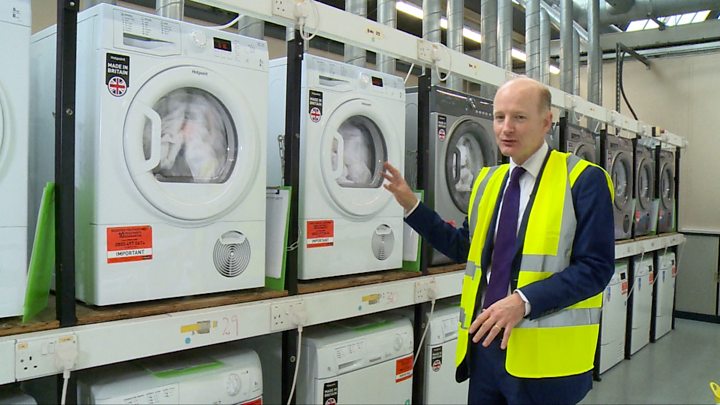Whirlpool tumble dryer recall uncovers 65,000 dangerous machines

Media playback is unsupported on your device
Some 65,000 fire-prone tumble dryers have been found during a recall campaign by Whirlpool, but hundreds of thousands still remain in UK homes.
The manufacturer extended its safety programme to offer free replacements in July after the regulator stepped in, four years after the issue emerged.
Dangerous dryers under the Hotpoint, Indesit, Creda, Swan and Proline brands were sold in the UK for 11 years.
Up to 800,000 were estimated to still be in use when the full recall began.
Machines were blamed for at least 750 fires over an 11-year period, the government has said. The fires have burnt out homes and destroyed possessions of victims – some of whom had no insurance.
Before the recall, Whirlpool primarily offered to modify affected dryers – a decision widely criticised by consumer and safety groups and which itself has led to concern over the safety of supposedly fixed machines.
What the full recall means for consumers
Anyone who thinks they bought a potentially dangerous dryer should call 0800 151 0905 or visit a dedicated website to check if their dryer is affected. If it is on the recall list, they should stop using it and unplug it immediately.
They can then choose:
- A free replacement dryer with no extra charges for collection or disposal of the old machine
- A free, one-hour modification of the old machine
- A discounted upgrade to a higher specification model than the free replacement
- A partial refund of up to £150, with owners of older machines getting less than those with newer ones
Since the start of the recall 65,000 affected dryers have been located, offers for a resolution have been made on 63,000 of them, with 42,000 of them having been repaired, replaced or refunded so far.
Whirlpool said it took a week, on average, for customers to receive a new dryer, modification, or refund from the point they make their choice. The majority (73%) had requested a replacement, the company said.
“Nothing matters more to us than people’s safety, so it is absolutely vital that we can identify where these affected dryers are and resolve the issue,” said Jeff Noel, Whirlpool vice-president.
‘Our scary experience’
Engineer Mark Garner and his wife Deborah owned an affected dryer and were eventually given a replacement, marked with a green sticker to identify it as safe.
Then, one day, Deborah, who was in the kitchen near the dryer, smelt smoke and when she opened the dryer door she was met with a cloud of black smoke and could clearly see flames at the back of the dryer.
“The truly scary part is that, assuming this was a safe machine, it had been turned on the previous night as we went to bed,” said Mark.
They were offered a replacement machine for £99 but were so unhappy with the situation they chose a refund instead.
A letter arrived, with a cheque for £220 enclosed. The trouble was, the cheque was unsigned.
A signed cheque eventually arrived, two months after the incident, but only after calls to Whirlpool chasing them up for the money.
Initial response ‘woeful’
Whirlpool said the number of owners with affected machines who had contacted the company since July amid a huge awareness campaign had risen sharply from fewer than 10,000 throughout the first half of the year.
It said its campaign over the past four years had resolved the issue for more than 1.7 million people, making it up to five times more successful than a typical product recall.
However, high-profile critics said that Whirlpool, as the owner of these brands, had a responsibility to deal with the situation adequately. Their initial response had been described as “woeful”.
Rachel Reeves, who chairs the influential Business Committee of MPs, told the BBC that – despite an improvement in Whirlpool’s handling of the case – concerns remained.
She said that the committee was worried about the number of potentially dangerous machines that remained in people’s homes, and that the modification process was “not as good as it should be”, with reports of supposedly safe dryers still catching fire – something which Whirlpool denies. It also wants policing of the second-hand market of white goods to be improved.
She added that the wider concerns were not helped by the lack of a fully independent product safety regulator.



